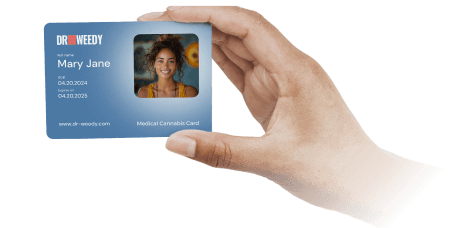Connecticut medical marijuana card FAQ
When applying for a medical marijuana card in Connecticut, you need to submit a certification from a licensed physician, valid proof of ID and Connecticut residency. If you are using a primary caregiver, provide proof of their identity. Registration is done through the DCP medical marijuana program portal.
A qualifying patient under the age of 18 cannot receive a medical marijuana card or purchase medical cannabis without a caregiver. Disabled individuals are allowed to appoint a caregiver. A caregiver must be 18 years of age or older and is only allowed to care for one patient except they are related.
Your medical marijuana records in Connecticut are kept confidential under the Freedom of Information Act, according to HB 5389. There are a few exceptions, which include law enforcement agencies, physicians and pharmacists, public and private entities for research purposes, licensed dispensaries and your primary caregiver.
It is not possible to get a Connecticut-issued medical marijuana card without a Connecticut ID or proof of residency.
Only physicians and advanced practice registered nurses certified by the DCP can prescribe medical marijuana in Connecticut. Healthcare providers must meet the DCP requirements.
It takes 30 business days for the Connecticut Medical Marijuana Program (MMP) to approve or deny an application. Once approved, the certificate will be emailed to the patient. Patients and caregivers are allowed to cut out the registration certificate from the approval letter, use the entire letter, or display the letter from their device.
Medical marijuana cannot be purchased using insurance in Connecticut. Consult your insurance company for more details.
As a registered medical marijuana patient in Connecticut, you need to take your medical ID card, a driver’s license or Connecticut-issued ID card, and a mode of payment. There are 18 licensed medical and hybrid marijuana dispensaries in Connecticut.
To register with the Connecticut Medical Marijuana Program, schedule an appointment with a state-licensed physician to verify eligibility. If eligible, the doctor will issue a certification, and you’ll be able to register with the DCP medical marijuana program portal. You’ll need to provide the following:
- Proof of Identity (e.g., CT or out-of-state driver's license, US passport, permanent resident card, etc.)
- Proof of Connecticut residency (e.g., utility bill, pay stub, mortgage statement, etc.)
- Current passport-size photograph
If you are designating a caregiver, indicate during this process. Once the application is approved, you will receive a certification email.
To register as a caregiver for a medical marijuana patient in Connecticut, the patient must have identified them as the primary caregiver during registration. Once identified, the prospective caregiver needs to register with the Connecticut Medical Marijuana Program and pass a criminal background check. This involves creating an account on the DAS Business Network website, logging in, selecting the "I am a Caregiver" option, providing identifying information, and uploading the required documents. Finally, the caregiver must read and affirm the terms on the Primary Caregiver Information page.
You can get a medical marijuana card online via the Connecticut MMP online system. Patients can obtain their physician-issued certification via telemedicine.
To renew your medical marijuana card in Connecticut, first obtain a new certification from your healthcare provider. Then, log in to your profile on the Connecticut medical marijuana system and provide photo ID, proof of Connecticut residence and other required documentation. Complete the six required certifications. Make sure all your details are correct, and if any information has changed (such as your address or name), ensure it's updated by your healthcare provider and reflected in your application. If errors are found, contact the Medical Marijuana Program to correct them.
Your Connecticut medical marijuana card is valid for one year, from the date the physician issues the certification. It’s essential to start the renewal process 30 days prior to the expiration date.
The renewal process for your medical marijuana card in Connecticut can be initiated up to 30 days before the expiration date of your current registration. Your qualifying patient's registration is valid for up to one year from the date of the physician, physician assistant, or advanced practice registered nurse's written certification. For example, if your certification date is October 1, 2022, your registration will expire on October 1, 2023.
It's important to note that the Department of Consumer Protection (DCP) does not send out reminders for recertification. Therefore, we recommend monitoring the alerts from Dr. Weedy.
We advise starting the renewal process well in advance to ensure a seamless transition. The renewal process is similar to the one you underwent for your original registration. Upon approval by the Program, recertified patients and caregivers will be issued new identification cards. Remember, the expiration date is indicated on the front of your card.
You'll need a valid photo ID, proof of residency, and updated medical records supporting your qualifying condition. Dr. Weedy's online application will guide you through the required documentation.
Yes, there is a fee associated with the renewal process. The recertification process involves an online consultation where a doctor will re-examine your medical condition. This consultation requires payment. However, Dr. Weedy values its patients and offers a renewal discount to make the process more accessible.
It's important to note that, as of July 1, 2023, the state registration fee for the renewal process has been eliminated. Previously, patients were required to pay an additional $100 registration fee to the state. With this recent change, you will no longer need to make this payment, contributing to a more affordable renewal experience.
Absolutely! Dr. Weedy provides renewal services regardless of whether you were initially certified by our platform or another healthcare professional.
If your medical condition has evolved, it's essential to update your healthcare provider during the renewal process. They will assess your current health status and ensure your certification aligns with your needs.
Yes, Dr. Weedy prioritizes the confidentiality of your information. Our platform operates on a secure and HIPAA-compliant system, ensuring the privacy of your personal details.
You can grow up to three immature and three mature cannabis plants as long as you are registered under the Connecticut MMP. This applies to medical marijuana patients 18 years and older, as well as adults 21 years and older.
Households with multiple registered patients can grow 12 cannabis plants. Marijuana cultivation can only be done in a private resident and only the patient and caregiver can access it.
If you are visiting a licensed medical marijuana dispensary, you need a Connecticut-issued medical card to buy cannabis products. Adults aged 21 or older with a valid government ID can buy marijuana at recreational dispensaries.
If you are visiting a licensed medical marijuana dispensary, you need a Connecticut-issued medical card to buy cannabis products. Adults aged 21 or older with a valid government ID can buy marijuana at recreational dispensaries.
Medical marijuana patients in Connecticut are exempt from taxes, which saves up to 20% on cannabis purchases. Recreational marijuana buyers are obligated to pay the 6.35% sales tax, 3% municipality-imposed sales tax, and a tax based on the THC content between 10 and 15% of the sales price.
Residents over the age of 21 can legally consume marijuana. Medical marijuana patients over the age of 18 can also smoke cannabis. But, medical cannabis is not available in a smokable form to patients under 18.
Medical marijuana is not a reason for labor discrimination, and the Connecticut Palliative Use of Marijuana Act (PUMA) protects all medical marijuana patients. Employers are prohibited from refusing to hire, terminating, penalizing or threatening employees who are medical marijuana patients or caregivers.
Yes, having a medical marijuana card in Connecticut means you cannot possess or use a firearm, in compliance with federal law.
Cannabis usage in Connecticut is prohibited in state parks, state beaches and waters. Certain places and property owners may create their own policies.
Get your medical marijuana card
Plant your health with Dr. Weedy. Get all the benefits of a medical card at a low price for a year



























